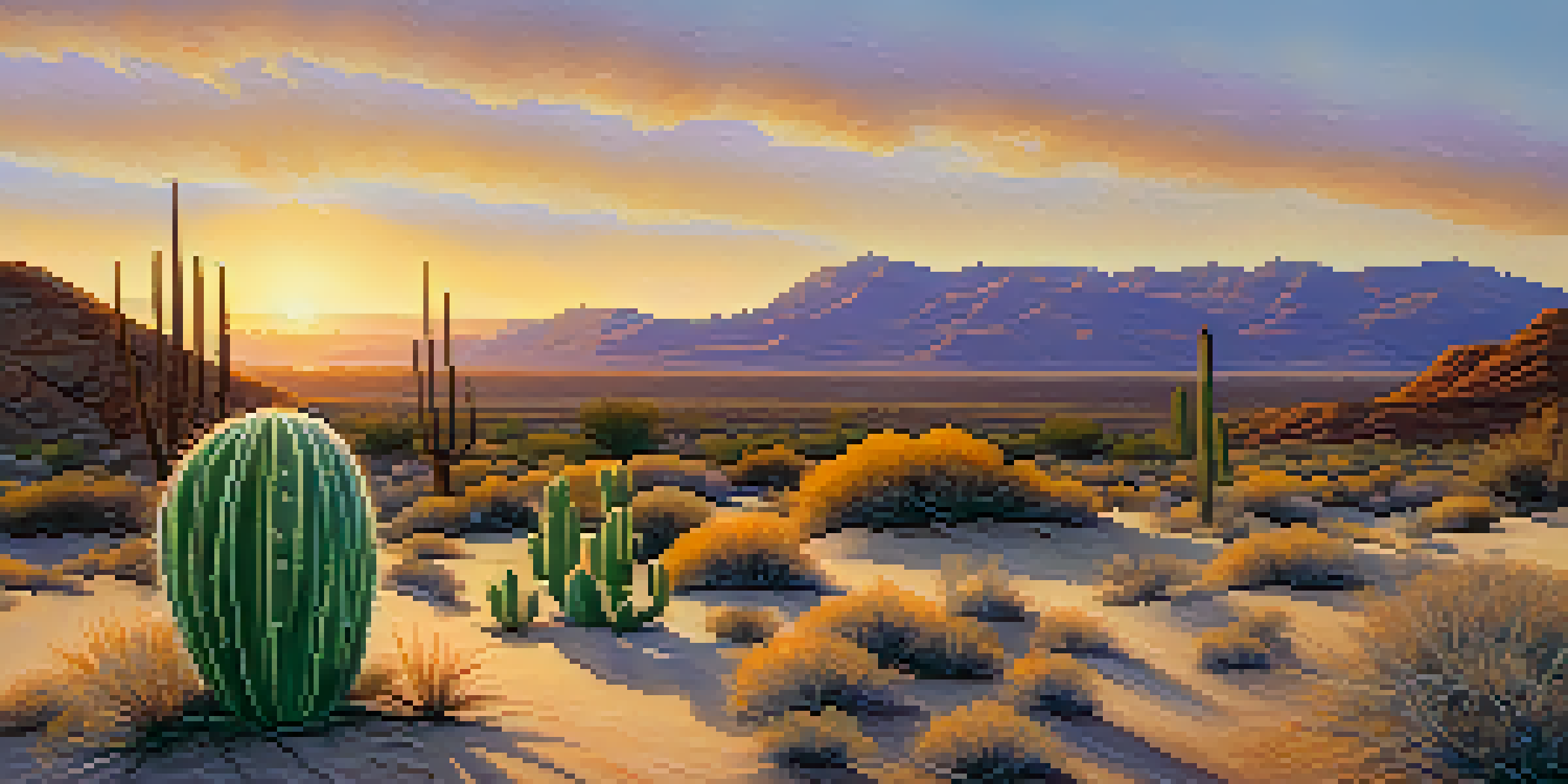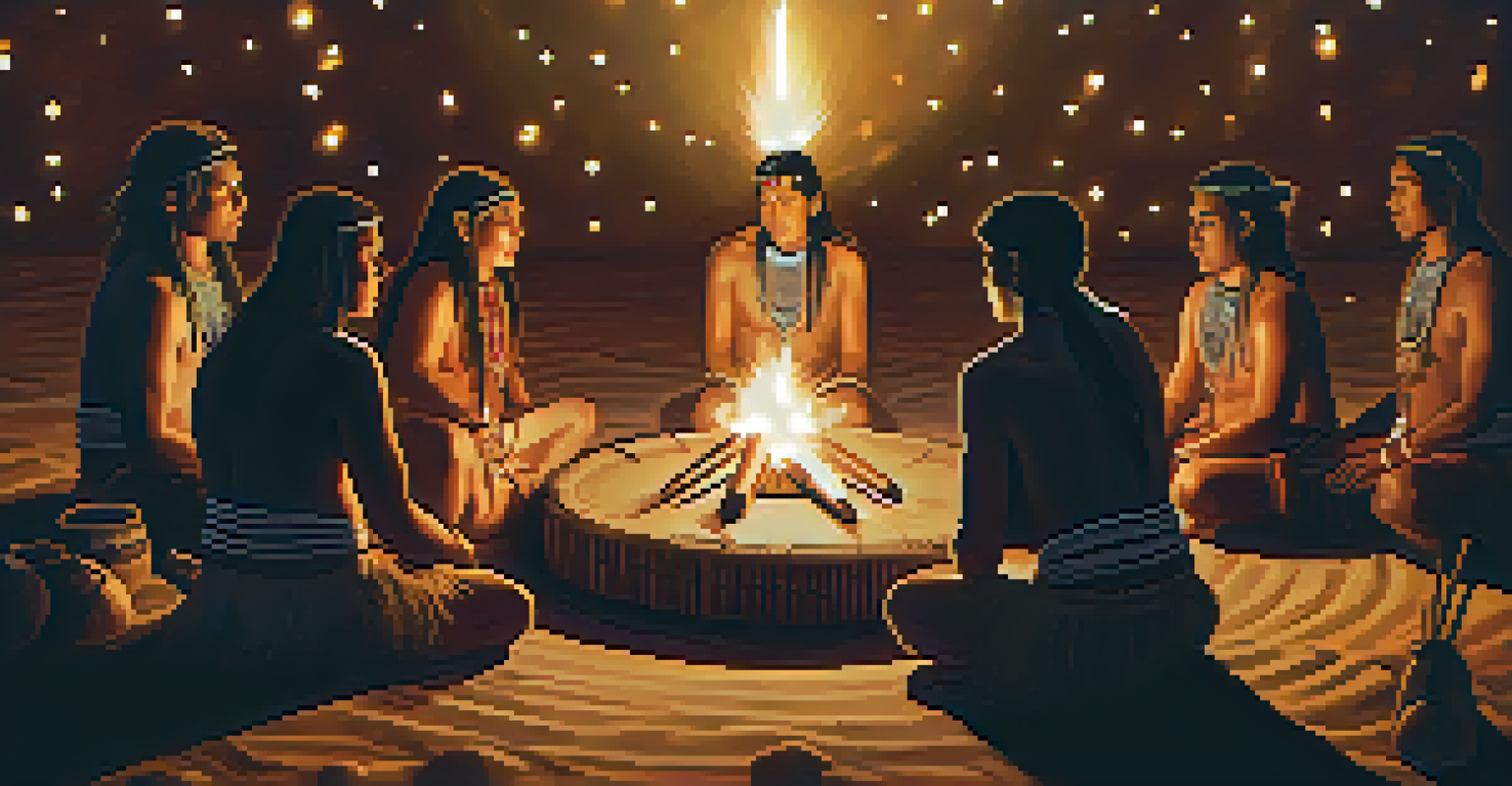Cultural Roots: Music and Peyote in Native American Rituals

Understanding Peyote: A Sacred Plant in Native Cultures
Peyote, a small cactus native to the southwestern United States and Mexico, holds significant spiritual importance for many Native American tribes. This plant is not just a hallucinogen; it is revered as a sacred medicine used in religious ceremonies. The active compound, mescaline, induces altered states of consciousness, allowing participants to connect with the spiritual realm.
The use of peyote is a sacred tradition that connects us to our ancestors and the spirit world.
For tribes like the Huichol and the Navajo, peyote serves as a bridge to the divine, facilitating healing and personal insight during rituals. These ceremonies often involve communal gatherings where participants seek guidance and clarity, emphasizing the collective nature of the experience. In this way, peyote transcends its physical form, becoming a vital tool for spiritual exploration.
Understanding peyote's role in these cultures offers insight into the deep respect Indigenous peoples have for nature and its gifts. The careful cultivation and harvesting of peyote are imbued with rituals that honor the land, illustrating a profound connection between the people and their environment.
The Role of Music in Native American Rituals
Music in Native American cultures is not merely for entertainment; it is an essential part of spiritual practices and rituals. Drumming, singing, and chanting are fundamental components that help create a sacred atmosphere during ceremonies. The rhythmic beats of drums, for instance, mimic the heartbeat of Mother Earth, grounding participants and enhancing their connection to the spirit world.

Songs often carry stories, teachings, and histories passed down through generations, making them a vital link to cultural identity. The lyrics may address themes of creation, nature, and ancestral wisdom, serving both as a form of worship and a means to educate younger generations. This storytelling aspect keeps the culture alive and thriving, fostering a sense of belonging among community members.
Peyote's Spiritual Significance
Peyote is revered as a sacred medicine in Native American cultures, facilitating spiritual connection and healing during rituals.
Moreover, music is used to guide participants through peyote ceremonies, providing structure and focus during the experience. Each song has a purpose, whether it’s to invoke healing, celebrate life, or seek guidance. In this way, music and peyote are intertwined, both serving as conduits for spiritual expression and connection.
Peyote and Music: A Harmonious Connection
The synergy between peyote and music creates a unique atmosphere during Native American rituals. As participants consume peyote, the accompanying music enhances their sensory experience, often leading to profound insights and emotional release. This combination fosters a sense of unity among participants, as they collectively navigate the spiritual journey.
Music is the universal language of mankind, and in Native American cultures, it carries our stories and traditions.
Musical elements, such as chants and drumming, can elevate the peyote experience, making it more transformative. The sounds resonate with the heart and spirit, often leading to visions and heightened awareness. This powerful blend of auditory and psychoactive elements serves to deepen the spiritual experience, allowing individuals to explore their inner landscapes.
In many rituals, the music guides the pacing of the ceremony, marking transitions between stages of the experience. Whether it’s a moment of reflection or ecstatic celebration, the music helps participants stay grounded while also encouraging them to delve deeper into their consciousness. This harmonious interplay underscores the importance of both elements in Native American spirituality.
Cultural Significance of Peyote Ceremonies
Peyote ceremonies are more than just spiritual events; they are vital cultural gatherings that reinforce community bonds. These rituals provide a space for individuals to share their experiences, struggles, and triumphs. Through collective participation, tribes strengthen their cultural identity and ensure the continuation of their traditions.
The ceremonies often address contemporary issues faced by Indigenous communities, such as healing from historical trauma and seeking guidance for the future. They serve as both a sanctuary and a platform for dialogue, allowing participants to connect with their heritage while addressing modern challenges. This duality of the ceremonies emphasizes their ongoing relevance in today's world.
Music Enhances Spiritual Rituals
Music plays a crucial role in Native American ceremonies, guiding participants and deepening their spiritual experiences with peyote.
Additionally, these gatherings are a means of cultural preservation, as they incorporate traditional songs, stories, and practices. By engaging in peyote rituals, younger generations learn from their elders, fostering a sense of responsibility to uphold their cultural legacy. This cyclical nature of teaching and learning ensures that the essence of the culture remains vibrant.
Challenges Facing Peyote Use in Modern Times
Despite its rich cultural significance, the use of peyote faces numerous challenges in contemporary society. Overharvesting, illegal trafficking, and environmental changes threaten the availability of this sacred plant. As demand increases, some tribes worry about the sustainability of peyote populations, which are crucial for their spiritual practices.
Additionally, the growing interest in psychedelic substances has led to a commodification of peyote, often stripping it of its cultural context. This trend can dilute the profound spiritual experiences that Indigenous peoples associate with the plant. It’s essential to approach peyote with respect and understanding, recognizing its sacredness rather than treating it as a recreational drug.
Efforts to protect peyote and its cultural significance are gaining momentum, with many Indigenous advocates calling for legal protections and sustainable practices. By raising awareness about the importance of preserving peyote and its associated rituals, tribes aim to educate outsiders and foster a greater appreciation for their cultural heritage.
The Future of Music and Peyote in Native Rituals
As society evolves, the role of music and peyote in Native American rituals will likely continue to adapt. While the core values and beliefs surrounding these practices remain unchanged, the ways they are expressed may shift to resonate with younger generations. This dynamic nature is crucial for the survival of cultural practices in a rapidly changing world.
Innovations in musical styles and the inclusion of contemporary instruments may emerge in rituals, reflecting the influence of modern culture. Such changes can help bridge the gap between traditional practices and the experiences of today’s youth, ensuring that these rituals remain relevant and engaging. Embracing evolution while respecting tradition is key to the future of these cultural expressions.
Challenges to Peyote Preservation
Modern challenges such as overharvesting and commodification threaten the cultural and spiritual significance of peyote for Indigenous communities.
Moreover, as awareness grows about Indigenous rights and cultural heritage, there may be increased support for the preservation of peyote and its associated rituals. Collaborative efforts between tribes and allies can strengthen the movement to protect these sacred practices. Ultimately, the future of music and peyote in Native American rituals hinges on the continued respect and reverence for their deep cultural roots.
Conclusion: Honoring Cultural Roots Through Rituals
In conclusion, the intertwining of music and peyote in Native American rituals represents a profound cultural legacy that deserves respect and understanding. These practices not only provide spiritual guidance but also reinforce community bonds and cultural identity. As we explore these traditions, it’s essential to approach them with an open heart and a willingness to learn.
Recognizing the challenges faced by these practices today is crucial for fostering appreciation and support for Indigenous cultures. By advocating for the preservation of peyote and the rituals surrounding it, we can contribute to the ongoing dialogue about cultural heritage and rights. This awareness can help ensure that future generations continue to benefit from the wisdom and insights these traditions offer.

Ultimately, honoring cultural roots through rituals is about more than just understanding the past; it's about embracing a shared future where Indigenous voices are valued and celebrated. As we navigate our own spiritual journeys, let’s remember the lessons embedded in these profound practices and strive to support the communities that keep them alive.